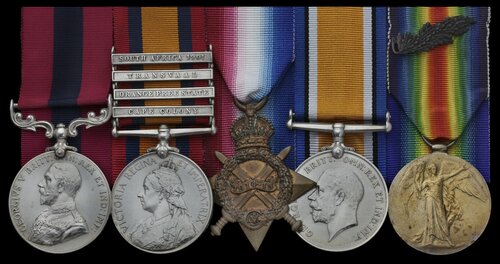
Auction: 22001 - Orders, Decorations and Medals
Lot: 550
'At 5 a.m. [on 17 April 1916], three Squadrons of German Cavalry came round the end of Lake Doiran towards Pateros, supported by a considerable force of infantry; one of their Squadrons came on towards Gola, their right flank patrol passing within a few yards of Sergeant Hethershaw and his troop who were lying concealed in some scrub and had been told not to fire, and approached the position where B Squadron were concealed.
We disclosed only a small patrol with Private Moore as its point riding a specially selected horse which would be difficult for the Germans to overtake. The Germans were very cautious and approached our patrol very slowly, while Moore waited for them in the hopes that some at least of the Germans would chase him and be led into the trap; unfortunately they would not do this though they were within speaking distance of him, so after a little conversation with them during which they told him to "go away, you blutty fool" (his remarks to them are not recorded), he rode slowly away to one side leaving the front of B Squadron unmasked.
The Germans stood in a bunch looking towards B Squadron's position and then turned to retire; the moment they did so it was evident that they would not be caught in the trap so B Squadron and the machine-guns opened fire. Unfortunately both the machine-guns - which were about 12 years old - jammed after a few rounds and consequently we only succeeded in wounding seven of their men and seven horses, according to the enemy intelligence reports obtained later.'
The Sherwood Rangers Yeomanry in the Great War 1914-1918, by Major H. Tallents, D.S.O., T.D., refers.
A most unusual Great War Salonika operations D.C.M. group of five awarded to Private E. S. A. 'Mundy' Moore, Nottinghamshire Yeomanry (Sherwood Rangers), late Imperial Yeomanry
Distinguished Conduct Medal, G.V.R. (989 Pte. E. S. D. Moore, Notts. Yeo.); Queen's South Africa 1899-1902, 4 clasps, Cape Colony, Orange Free State, Transvaal, South Africa 1901 (735 Pte. E. S. Moore, 10th Notts. Coy. Imp. Yeo.); 1914-15 Star (989 Pte. E. S. A. Moore, Sher. Rang.); British War and Victory Medals, M.I.D. oak leaf (989 Pte. E. S. A. Moore, Notts. Yeo.), note third initials, polished, nearly very fine or better (5)
D.C.M. London Gazette 14 November 1916:
'For gallantry and coolness when sent out to try and lure a party of the enemy into an ambush. He behaved in a remarkably plucky manner when in very close touch with the enemy.'
Edmund Schneider Dodwell Moore was born at Honington, Lincolnshire on 22 April 1874, one of 10 children of Canon Henry Dodwell Moore. Accompanying family notes describe him as something of a colourful character, for he was often in trouble as a youngster; on one occasion he filled some flower pots with gunpowder, turned them upside down and tried to blow them off the top of the church tower.
Sherwood Ranger
A natural recruit for the Yeomanry, he joined the Sherwood Rangers, and was among those chosen to form 10th Company, 3rd Battalion, Imperial Yeomanry for service in the Boer War. The unit arrived in South Africa in February 1900, one of the first to do so, and was actively employed in operations the Transvaal, Orange Free State and Cape Colony until 1901 (Queen's Medal & 4 clasps).
A natural recruit for the Yeomanry, he joined the Sherwood Rangers, and was among those chosen to form 10th Company, 3rd Battalion, Imperial Yeomanry for service in the Boer War. The unit arrived in South Africa in February 1900, one of the first to do so, and was actively employed in operations the Transvaal, Orange Free State and Cape Colony until 1901 (Queen's Medal & 4 clasps).
Moore was otherwise a farmer, his father having given him £1500 capital in 1904. He used the money to purchase the leasehold of the farm 'Court Leys' at Brandon, near Grantham and was likewise employed at the outbreak of the Great War in August 1914.
Gallipoli and beyond
Mobilised with the Sherwood Rangers, he was embarked for Egypt and landed at Gallipoli in August 1915, where the regiment won the King's Colour. Moore and his comrades next served in Egypt, and thence in Salonika from February 1916, taking part in the operations in the Struma Valley. Here, then, the scene of Moore's gallantry in April 1916, for which, as cited above, he was awarded the D.C.M. He was also mentioned in despatches (London Gazette 25 September 1916, refers).
The Sherwood Rangers next joined the Australian Mounted Division in Palestine in 1917, and participated in the capture of Beersheba and the raid on Es Salt in the Jordan Valley; in Allenby's advance from Jaffa to Aleppo they captured at sword point the Turkish batteries on Mount Carmel, Haifa. Indeed the Rangers received more mentions in the Official History of the campaign than any other regiment.
Having ended the war in Syria, Moore returned home and resumed farming at Court Leys. But the farm had been run down in the war years and he was unable to make it a profitable concern. He sold up and went into breeding wire-haired fox terriers and running a small poultry farm at 'The Hollies' at Brant Broughton. Very much a local character, he regularly sported plus fours and a spotted bow tie, and was rarely seen without pipe clenched between teeth. 'Mundy' Moore died on 27 April 1949 and is buried in St. Helen's Church, Brant Broughton; sold with copied research.
Subject to 20% VAT on Buyer’s Premium. For more information please view Terms and Conditions for Buyers.
Sold for
£1,400
Starting price
£1300




